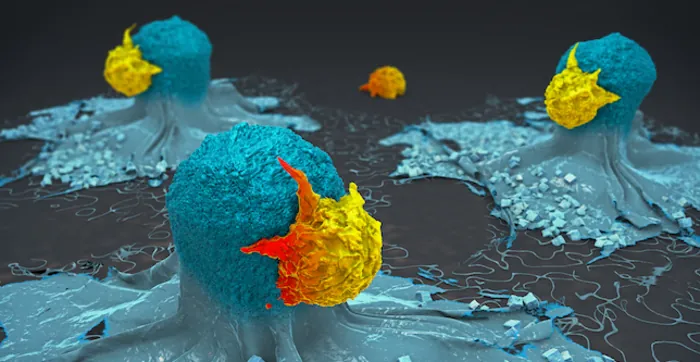
New Hope for Melanoma and Breast Cancer: Revolutionary Combination Immunotherapy Shows Promising Results!
2025-01-24
Author: Mei
Introduction
In a groundbreaking study, researchers from the Medical University of Vienna have unveiled a new combination immunotherapy that could revolutionize the treatment landscape for locally accessible cancers like melanoma and breast cancer. This innovative therapy merges the systemic administration of the tissue hormone interferon-I (IFN-I) with the localized application of TLR7/8 agonist imiquimod, a powerful duo that not only eradicates tumors at the treatment site but also generates a strong immune response to tackle distant metastases.
Study Findings
Published in *Nature Cancer*, the findings highlight a significant leap forward in offering more effective therapeutic options for patients battling these aggressive cancers. The therapy harnesses the body’s immune system to directly target and destroy cancer cells. Imiquimod, widely known for its use in treating basal cell carcinoma, triggers plasmacytoid dendritic cells (pDCs) to produce IFN-I, which then activates additional dendritic cells and macrophages within the tumor’s microenvironment. These cells release interleukin-12, a cytokine known to inhibit the formation of new blood vessels that tumors rely on, ultimately leading to cancer cell death.
Combination Approach Benefits
The combination approach has not only shown to reduce metastasis and prevent relapses, but it has also increased the sensitivity of melanoma to immune checkpoint inhibitors, a much-anticipated advancement in cancer treatment. Lead researcher Dr. Maria Sibilia, who heads the Center for Cancer Research at the Medical University of Vienna, stated, “This combination therapy shows great promise in improving outcomes for patients with locally accessible tumors, offering both direct tumor cell death and an enhanced systemic immune response to distant metastases.”
Preclinical Models and Mechanism
In preclinical models, the systemic application of IFN-I fortified the immune system’s response to topical imiquimod, resulting in a powerful anti-tumor effect. The inclusion of immune checkpoint inhibitors further strengthened the immune system's capacity to target rogue cancer cells effectively. "Topical treatment of the primary tumor is essential for this therapy to clear distant metastases," emphasized Philipp Novoszel, a co-author of the study.
Signaling Pathway Discovery
A critical finding of the study revealed the significance of the signaling pathway mediated by c-Jun/AP-1, which elevates key chemokines such as CCL2 and vital cytokines like interleukin-12 in dendritic cells. This mechanism effectively disrupts the production of vascular endothelial growth factor-A (VEGF-A), starving the tumors of the necessary blood supply they need to grow and spread.
Expert Insights
Dr. Martina Sanlorenzo, a co-first author on the study and an expert in dermato-oncology, elaborated, “By combining systemic IFN-I with topical imiquimod, we’ve devised a strategy that not only obliterates local tumors but also engenders lasting CD8+ T cell-mediated immune memory.”
Potential and Future Directions
The potential of this combination therapy is further underscored by clinical data indicating that IFN-I enhances TLR7/8 activation in human dendritic cells, mirroring the positive outcomes observed in preclinical trials. With IFN-I already recognized as an effective cancer therapy, researchers are optimistic about advancing this promising approach into clinical trials.
Conclusion
“This innovative strategy offers hope for patients who are currently not responding well to existing immunotherapies,” Dr. Sibilia added. “We truly believe it could significantly enhance treatment outcomes for individuals facing superficial tumors like melanoma and breast cancer.”
Looking Ahead
As this research continues to evolve, it exemplifies the relentless pursuit of developing tailored therapies that leverage the immune system's capabilities, igniting new hope for countless patients worldwide battling these challenging cancers. Stay tuned for updates as this therapy progresses toward clinical application—it could be the game-changer the medical community has been waiting for!




 Brasil (PT)
Brasil (PT)
 Canada (EN)
Canada (EN)
 Chile (ES)
Chile (ES)
 Česko (CS)
Česko (CS)
 대한민국 (KO)
대한민국 (KO)
 España (ES)
España (ES)
 France (FR)
France (FR)
 Hong Kong (EN)
Hong Kong (EN)
 Italia (IT)
Italia (IT)
 日本 (JA)
日本 (JA)
 Magyarország (HU)
Magyarország (HU)
 Norge (NO)
Norge (NO)
 Polska (PL)
Polska (PL)
 Schweiz (DE)
Schweiz (DE)
 Singapore (EN)
Singapore (EN)
 Sverige (SV)
Sverige (SV)
 Suomi (FI)
Suomi (FI)
 Türkiye (TR)
Türkiye (TR)
 الإمارات العربية المتحدة (AR)
الإمارات العربية المتحدة (AR)